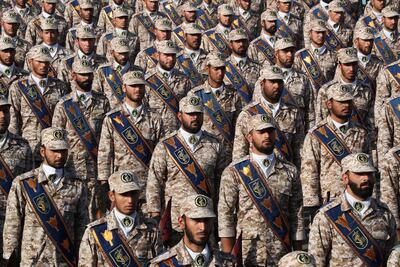Iranian President Hassan Rouhani on Sunday said Iran would present a regional peace plan to the UN at the General Assembly in New York this week, after the attacks on Saudi Arabia’s oil infrastructure and the US order to send more troops to the region.
"In this sensitive and important historical moment, we announce to our neighbours that we extend the hand of friendship and brotherhood to them," Mr Rouhani said.
Meanwhile, an Iranian official said that the British-flagged Stena Impero tanker would shortly be released from detention in the country's Bandar Abbas port, state news agency Fars reported.
Iran detained the Stena Bulk tanker in the Strait of Hormuz on July 19, two weeks after the Gibraltar government detained the Iranian Grace 1 tanker on suspicion of breaching EU sanctions by taking oil to Syria.
Stena Impero and its 16 remaining crew will "begin its movement from the port of Bandar Abbas toward international waters", said Allahmorad Afifipour,head of the Ports and Maritime Organisation in Hormozgan Province.
Mr Afifpour did not say when the tanker would be released.
Mr Rouhani on Sunday called on foreign powers in the Gulf region to "stay away".
"Foreign forces can cause problems and insecurity for our people and for our region," he said in a televised speech at an annual military parade.
"If they're sincere, then they should not make our region the site of an arms race. Your presence has always brought pain and misery for the region.
"The farther you keep yourselves from our region and our nations, the more security there will be for our region."
After his speech, the armed forces paraded their latest equipment, including tanks, missiles and armoured vehicles as Mr Rouhani and military commanders saluted them.
The annual military parade marks the start of the week commemorating Iran's 1980-1988 war with Iraq.
Javad Zarif, Iran's Foreign Minister, said that his country was steeled for conflict with America.
The consequences of even limited strikes in retaliation for this month's attack on Saudi Arabia's main oilfield would not be easily contained, Mr Zarif told US broadcaster CBS.
“I’m not confident that we can avoid a war," he said. "I’m confident we will not start one but I’m confident that whoever starts one will not be the one who finishes it.
“That means there won’t be a limited war.”
Mr Rouhani is expected to travel to New York on Monday, a day before general debate begins at the UN General Assembly.
Tension has increased between Iran and the US after the devastating September 14 attacks on Saudi oil installations that Washington and Riyadh have blamed on Tehran.
After the attacks, the US announced on Friday that it was sending reinforcements to Saudi Arabia at "the kingdom's request".
The Houthi rebels in Yemen claimed responsibility for the attack, a claim rejected by the US.
Mr Zarif said accusations that Iran was arming the Houthis with missile and drone technology were not true.
”The weapons the Yemenis have said these are Yemeni made," he said. "I've heard news stories that they are different from the weapons that we produce.
"I believe the Yemenis. Based on what I know, the Yemenis have the technology and the know-how.”
But the Iran-backed group on Friday offered to halt all attacks against Saudi Arabia as part of a peace initiative.
The UN special envoy for Yemen welcomed the offer on Saturday, saying it could bring an end to years of conflict.
Implementation of the initiative by the Houthis "in good faith could send a powerful message of the will to end the war", Martin Griffiths said.

The Houthis, who control the capital Sanaa and other parts of Yemen, have been fighting against a Saudi-led coalition which supports the country's internationally recognised government in a five-year war.
Mr Griffiths praised "the desire for a political solution to end the conflict".
Saudi Arabia gave a cautious response on Saturday.
"We judge other parties by their deeds, actions and not by their words, so we will see whether they actually do this or not," said Adel Al Jubeir, Minister of State for Foreign Affairs.
Mr Griffiths stressed "the importance of taking advantage of this opportunity and moving forward with all necessary steps to reduce violence, military escalation and unhelpful rhetoric".
Mr Al Jubeir warned of "appropriate measures" once the source of the strikes on its oil facilities was confirmed.
"We have asked the United Nations to do an investigation and there are also other countries involved in the probe," he said.
"We are sure the attack was not launched from Yemen but from the north.
"When [the probe] is completed, we will take the appropriate procedures to deal with this aggression."
Tensions have flared in the Gulf since May, when Tehran began reducing its commitments to the nuclear deal and the US said it was sending forces to waters near Iran in response to "indications of a credible threat" from its forces.
US President Donald Trump withdrew America from the deal more than a year ago, and reimposed crippling sanctions on the Iranian economy.
The US sent an aircraft carrier strike group and a bomber task force to the sensitive waterways, before sending B-52 bombers, an amphibious assault ship and a Patriot missile battery.
The head of Iran's navy said on Sunday that Tehran was ready to defend its marine borders and would deliver a "crushing reaction" to any aggression.
"In case of any miscalculation and aggression by the enemy, the navy, along with other armed forces of the country, will give the most crushing reaction in the shortest time possible," Rear Adm Hossein Khanzadi told the semi-official Mehr news agency.
"Today, the Islamic Republic of Iran's defence power is at its highest possible level and forces of the army and [Revolutionary Guard] are ready to defend marine borders of the country."



















